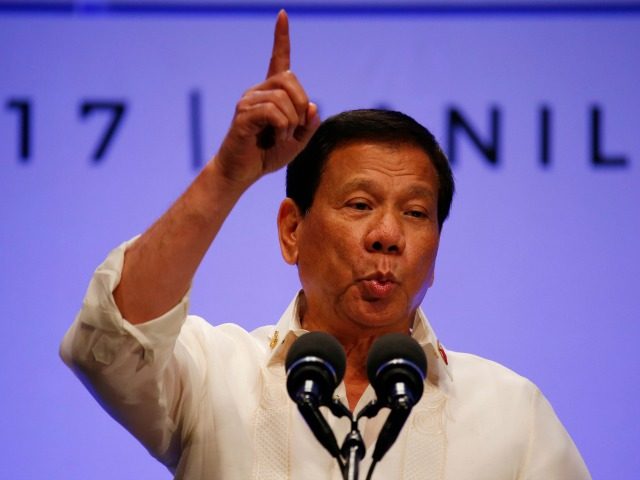Philippine Immigration Commissioner Jaime Morente said on Tuesday that roughly 2,800 Chinese nationals granted “visas upon arrival” under a program to encourage Chinese tourism have overstayed their visas and will now be expelled from the country.
He did not specify exactly when they must leave, or how they would be expelled if they refuse to do so.
The South China Morning Post (SCMP) explained that the background for Morente’s announcement is a massive bribery scandal at his agency. According to whistleblowers, immigration officers have been accepting cash bribes from Chinese nationals that were commonly rolled up in sheets of white paper, making them resemble a popular Philippine confection known as a pastilla.
Whistleblowers said the bribery operation was so huge that it actually kept payroll records for each immigration officer on the take, carefully distributing the correct amount of pastilla bribery cash each corrupt agent “earned” from their Chinese customers. The scheme reportedly harvested almost $20 million in bribes before it was exposed.
Investigators and human rights activists further alleged that the bribery scheme was linked to Chinese organized crime, which has been using Philippine offshore gambling operations known as POGOs as a conduit for sex trafficking. Many of the Chinese nationals who bribed Philippine immigration officials, or entered through the instant visa-on-arrival program as “tourists,” were allegedly working for these gambling, trafficking, and drug smuggling operations.
Among other nefarious activities, the bribed immigration officials helped Chinese “tourists” avoid the normal immigration and vetting process when they claimed their instant visas.
According to an investigation conducted by the Philippine opposition in the Senate, four million Chinese nationals might have entered the Philippines over the past three years.
Philippine President Rodrigo Duterte stood behind Morente when the bribery scandal erupted in February, insisting he has “loved” Morente since Duterte was the mayor of Davao City, his hometown, and Morente was the mayor.
Duterte said Morente is a “kind” man who “cannot do such unlawful acts.” The Philippine president then announced he would fire almost everyone at the immigration bureau except Morente. 19 Bureau of Immigration officials were sacked in February. A presidential spokesman called the pastillas scheme an “anomaly” and a “grave form of corruption which annot be countenanced by the government.”
Critics have not accused Morente of being involved in the bribery scheme, but they are not happy with the notion that he was unaware of such a massive operation being conducted under his nose. Opposition Senator Risa Hontiveros said the immigration bureau became a “one-stop shop of corruption” on Morente’s watch. One of the whistleblowers estimated 90 percent of the immigration officials posted at the Ninoy Aquino International Airport were involved in the scheme.
The visa-on-arrival program for Chinese tourists was launched in 2017 and hailed as a great success by the Philippine Department of Tourism, which estimated in 2019 that Chinese visitors brought over $2 billion into the Philippine economy. Morente claimed only about five percent of Chinese visitors used the visa program, but critics say the number of Chinese nationals who used bribes to obtain illegal visas is vastly larger than the figure Morente cited.
The Philippines began shutting down visa programs in March 2020 due to the coronavirus. A special retirement visa program that brought in a remarkable number of Chinese “retirees” in their mid-30s was suspended last week.
Morente’s announcement that thousands of Chinese visa overstays will be deported was met with great skepticism by critics who doubted his scandal-plagued agency has the resources to implement such a massive deportation program, or that Duterte’s administration would risk China’s wrath by deporting its citizens. Duterte insisted there was no reason to restrict immigration from China or deport Chinese nationals when the coronavirus pandemic hit the Philippines.
“Apparently there is a lot of talk in the media and Facebook, even one saying send the Chinese home. You know, it is not only a case of bad taste but it is not good for us Filipinos to be saying that. Now if you ask will I bar the Chinese from entering, the answer of course is ‘no’. That is an utter disrespect to a human being,” Duterte said in February.

COMMENTS
Please let us know if you're having issues with commenting.